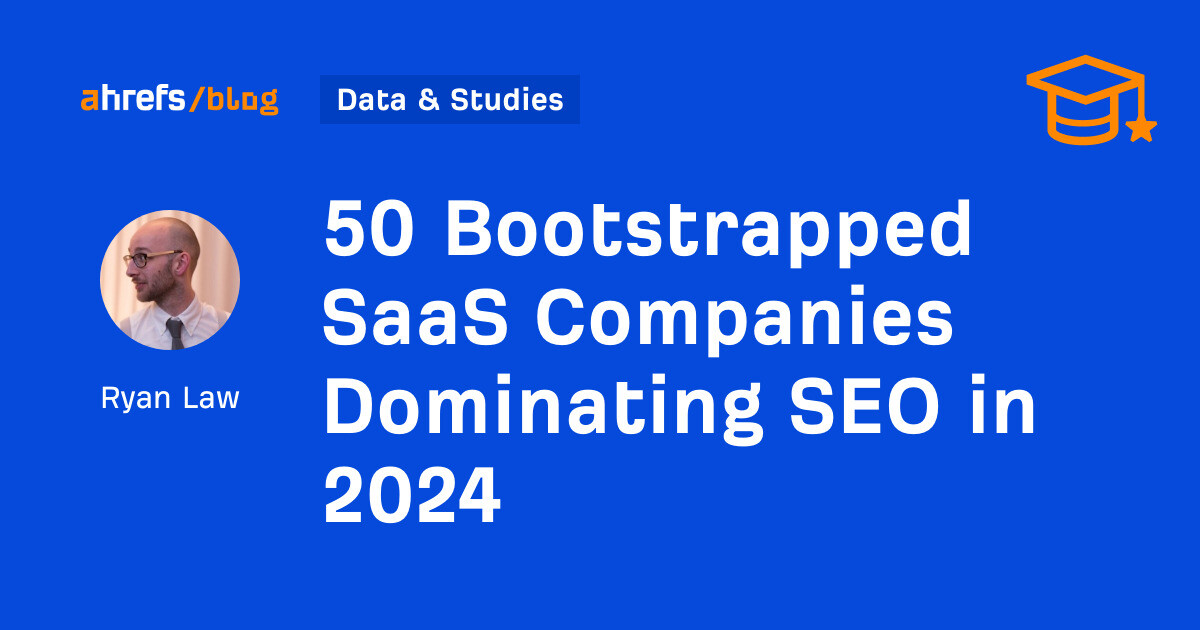As a marketing manager at HubSpot, I’m always looking for tech tools that are easy to use and save me valuable time in my day. And when it comes to advertising management software, I have some non-negotiables, like integration, automation, and advanced reporting.
If you work in advertising and haven’t been using ads management tools (or even know what they are), you could be missing a trick.
In this blog post, I’ll talk about what ad management is, outline high-quality advertising management software, and explain why they’re beneficial for all businesses.
Let’s dive in.
Table of Contents
What is Advertisement Management?
Advertising management is overseeing different marketing activities and responsible individuals to ensure that ad campaigns are running effectively and target markets are being reached.
Depending on your business needs, advertising management can focus on various metrics that contribute to campaign success, like ROI, conversions, or media placements that make sense for where your target audiences are.
As a senior marketing manager, I’ve seen the value of advertising management first-hand, but I know it’s difficult without effective advertising management software.
Advertising Management Software
Before I take you through my list of the best ads management tools, I’ll get you up to speed on what they are and the benefits they bring.
What is an Ads Management Tool?
Ads management tools streamline and automate different aspects of advertising, including ad and campaign planning, collaboration, execution, sharing, monitoring, and analysis. Some of these tools are all-rounders, while others focus on specific advertising tasks, such as social media campaign management.
Why Do I Use Ads Management Tools?
Not every ad management tool out there has the functionality I’m looking for. That said, I’ve found that my personal favorite ad management software programs offer the following benefits:
- They save me valuable time.
- I find them very user-friendly for marketing and advertising professionals — not just the tech-savvy ones.
- They have features that increase my productivity and efficiency.
- They allow me to easily collaborate with others, such as marketing team members and ad agencies.
- They let me operate cross-channel marketing campaigns with ease.
- They help me optimize campaign structures and workflows.
- Many ad management tools have powerful analytics and reporting tools, which have given me insightful, customizable reports.
- I can visualize advertising data that’s specific to my marketing goals.
- They increase the likelihood that my campaigns will reach their target audience and succeed.
Now that you know why I use advertising management software, I’ll give you my honest review of the best tools I found and tell you what they do best.
Best Ads Management Tools
1. HubSpot Ad Management Software
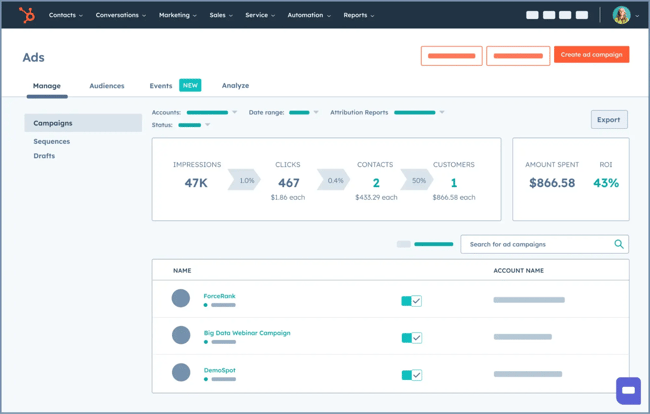
As a marketing professional and HubSpot employee, I have lots of experience using HubSpot’s customer relationship management (CRM) platform and its ad management and tracking software.
This platform has become my go-to hub for inbound marketing campaigns, and I regularly call on its various features for marketing support, such as:
- Ad creation and lead syncing with my preferred CRM (HubSpot, of course!).
- Automated ad targeting, which I find efficient regardless of project size.
- Integration of ad campaigns across various platforms, such as LinkedIn, Facebook, Instagram, and Google Ads. This helps me see the fruits of my multi-channel marketing strategies under one roof.
- Flywheel reporting, which gives me detailed insights on leads and return on investment.
What I like: Call me biased, but I find this tool to be very user-friendly — I think it’s suitable for any marketer, regardless of their technical skills. I was able to get started quickly, and I didn’t need to do any IT setup.
Price: It’s free, but you can get additional features in the premium versions of HubSpot. See the pricing page for more information.
2. AdRoll
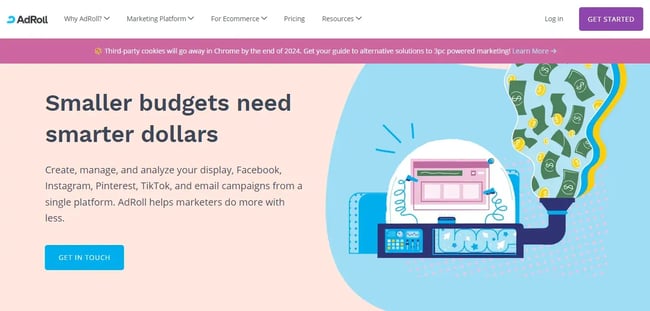
AdRoll is an all-in-one marketing management platform that caters to teams of different sizes and marketing budgets. I usually associate it with ecommerce advertising, but it has plenty of other tricks up its sleeve.
I played around with some AdRoll features to see how they stacked up, and here’s what stood out to me:
- The display ads let me easily introduce media elements like animation, audio, images, and videos into ads.
- I loved the retargeting feature. After a potential customer bounces, AdRoll sends automated emails and shows them display ads to help win them back. I tested the tool on myself, and what surprised me most is that it’s quite… gentle. Typically, retargeting ads can be a little much to the person on the receiving end, but AdRoll strikes a nice balance between doing what it has to and not getting on the recipient’s nerves.
What I like: With features like consent management, I appreciate how seriously AdRoll takes customer data protection and makes it easy for marketers. Also, I like that AdRoll has management services for those who want an ads management solution that isn’t too time-consuming.
Price: Native and display ads are pay-as-you-go, and its Marketing & Ads+ plans start at $36 per month. I was disappointed to learn that social media channels aren’t in the pay-as-you-go option. That means no Facebook ads unless you fork out on a monthly plan.
3. RollWorks
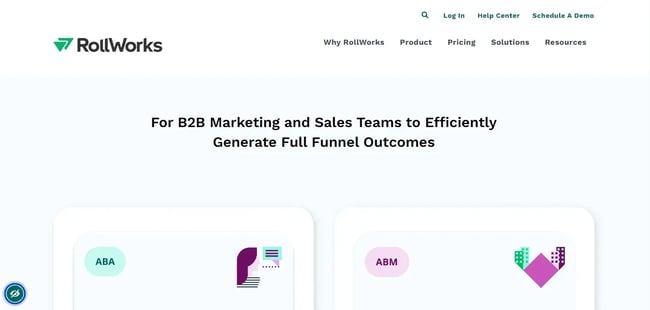
RollWorks is an account-based marketing and advertising platform targeted at various industries, such as technology and business services. I think this advertising management tool will benefit anyone involved in account-based marketing, from beginners to seasoned pros.
Here are some features and benefits I made sure to note when testing this tool:
- It gave me a good insight into anonymous users and their actions.
- Its keyword intent data let me bring search engine optimization into play.
- It has an impressive fit-scoring feature, which helped me prioritize high-value accounts. In essence, RollWorks uses machine learning to create an Ideal Customer Profile, and it then gives a “fit grading” from A to D. This means I could see which accounts I’d have the best chance of converting.
What I like: I like that RollWorks doesn’t pretend to be my all-in-one marketing and advertising solution. Instead, it makes life easier by integrating with the top CRM tools (e.g., HubSpot, Salesforce).
Price: I found that their pricing page was big on marketing but murky on figures. This left me thinking, why bother with a pricing page if you won’t tell me your prices? So, you’ll have to schedule a demo to get a quote that fits your needs.
4. Influ2
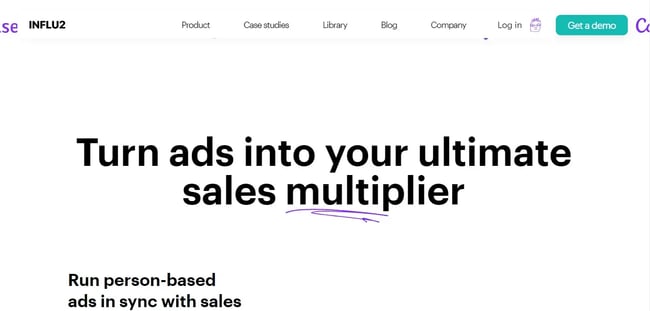
Influ2 is high up on the list of my favorite person-based marketing tools. Essentially, you target certain people, like decision-makers, and check up on their engagement with your ads.
In reviewing this advertisement management tool, I took a deep dive into various features, such as:
- Person-based targeting, which identified key decision makers and let me run ads wherever they would be most effective, including LinkedIn, Google, and Amazon.
- Contact-level engagement data, which gave me all I needed to know to initiate conversations with leads.
- Buyer journey building, which provided me with features like automated content marketing.
- Impact and revenue measurement, which gave great pointers on how to turn hunches into data-driven decisions.
What I like: I think the level of detail that goes into their person-based ad tool is excellent.
Price: There was no misleading pricing page here. Instead, I was prompted to contact them for pricing. A 30-minute product demo is also available.
5. 6sense
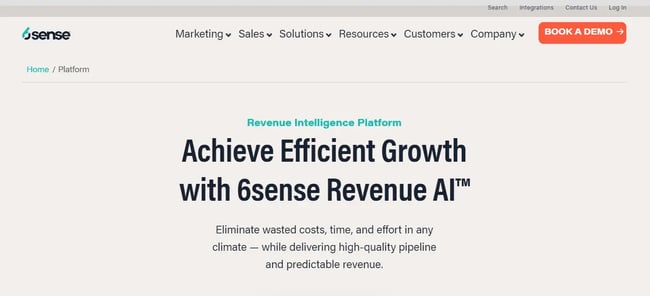
6Sense is an account-engagement platform with account-based advertising capabilities. The platform uses AI, big data, and machine learning to help marketers identify their target audience’s buying behavior, prioritize sales and marketing accounts, and create and share personalized and engaging campaigns/content.
I think the technologies used by 6sense should be in any marketer’s arsenal. Why? Its proprietary Revenue AI™ feature collects data on things like website activity, company size and revenue, buyer profiles, and intent. But as any good marketer knows, data alone isn’t enough to convert.
What impressed me about Revenue AI™ was what it did with the data collected. It could tell me which employees are on the buying team, when to contact them, and even what to say.
While this approach wasn’t foolproof, I was impressed with the intelligence gathering and found the suggestions provided sensible.
To get a better idea of what 6Sense’s AI-driven approach can do for advertising professionals, I took a look under the hood. Here’s what I found:
- Account identification allowed me to sort anonymous and known buyers.
- Predictive analytics put the tool’s AI-powered chops to good use. The useful digital marketing benefits I noted were buyer stage predictions and data on the best time to engage potential buyers.
- The conversational email feature, which leverages AI to craft personalized emails, didn’t read awkwardly, which is such a hazard with some AI tools (I’m looking at you, ChatGPT).
What I like: I think the laundry list of integrations is useful for people like me who can’t stick to one tool. A minor point, but 6sense’s explanation of the so-called “Dark Funnel” shows that this company practices what they preach — I think it’s a masterclass in content marketing and great entertainment.
Price: Contact 6sense for pricing.
6. Celtra
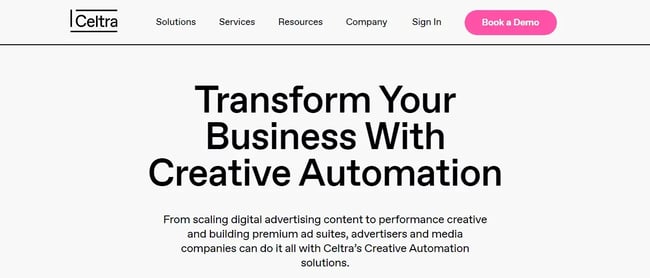
Celtra is a cloud-based software program that automates creative production. With the platform, all aspects of collaboration are streamlined and more efficient thanks to its cloud-based nature — team members can design, approve, and share digital assets among markets, campaigns, and more.
For this article, I had a look at Celtra’s three solutions, namely Creative Automation, Dynamic Product Ads, and Creative Enablement, to test their features. Here’s what I found:
- If you’re like me and appreciate modularity, you’re in luck with Creative Automation. The modular design made it easy for me to tweak content or design without altering the original image format.
- The Dynamic Product Ad feature has some great options for product sellers, such as ad templates and video.
- Creative Enablement really shows what Celtra brings to the table. To test this feature, I created an out-stream video ad for a car, which I used on a basic blog article. The transition from text to the ad was smooth, and the loading was superfast. Creating this ad from scratch was quicker than I expected, and I didn’t get frustrated when playing around with the various features.
- I forgot that this tool is cloud-based. Internet connectivity isn’t usually a problem for me, but a spotty internet connection while I was on the move interrupted my creative flow.
What I like: The ad builder is very user-friendly — I particularly liked the drag-and-drop components. Also, I think Celtra should be commended for trying to increase ad load speed while reducing the carbon footprint of advertising professionals.
Price: Get in touch with Celtra.
7. Smartly
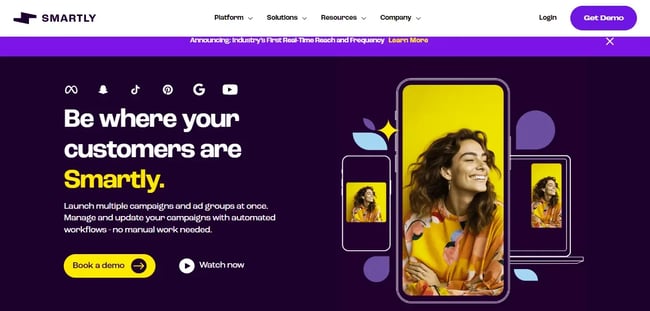
Smartly is an AI-primed advertising company that specializes in social media. It started out with just Facebook advertising, and it has now branched out to include Instagram, Google, Pinterest, Snapchat, and TikTok.
Here’s some notable features I found in my quest for the best ads management tools:
- Smartly’s all-in-one platform comprises three “suites,” namely Media, Creative, and Intelligence. For me, this made for a good user experience, since I found it easy to navigate through the platform.
- Real-time insights and optimization give you all the data you need on one platform. I was able to set KPIs for a marketing campaign I designed and integrate third-party data to measure performance accurately.
- Integration with Meta, Snapchat, TikTok, and Google Marketing.
What I like: I liked playing with Smartly’s snazzy pivot tables, which look and feel better than boring old Excel sheets (sorry, Microsoft).
Price: Book a demo and start from there.
8. WASK
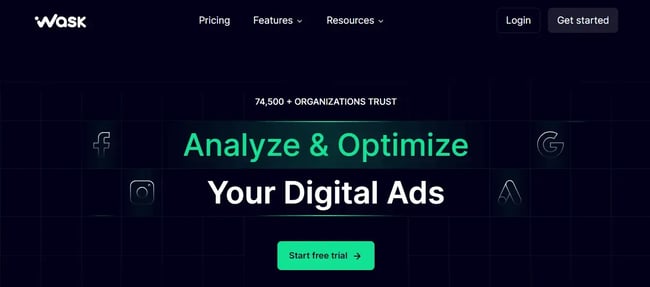
WASK helps manage and optimize digital ads without the need for deep technical knowledge or an enterprise-sized wallet.
Its main selling points are:
- Campaign optimization, which I found quick and user-friendly.
- Smart advice, which gave me highly actionable insights on cost per click when I paired it with my Google Ads account. Instead of just telling me what I wanted to hear, it helped identify missed opportunities, like lost impressions, and gave advice on how to improve (e.g., changing keywords).
What I like: I’m always up for a free trial, and WASK gives you one week free to show you its value. It also has some free tools, like pay-per-click (PPC) competitor analysis and a keyword research tool.
Pricing: Some clear pricing — hooray! The basic plan is $29/month, and the professional plan is $129/month.
9. Marin Software
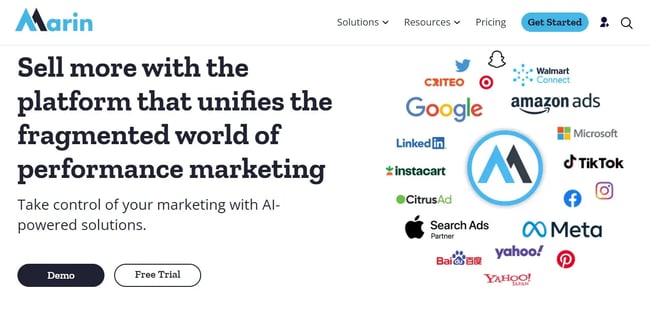
This performance marketing software is beyond the budget of some marketers, but it has great integration and functionality. What’s more, it’s trusted by some major companies worldwide.
I used a free trial from Marin, and here are my takeaways:
- From my trial run, I could see how Marin would save time and provide revenue-generating insights.
- Its bidding engine provided personalized bidding strategy recommendations — this feature is something I’ve recommended to marketing contacts who need bid management services.
- I liked the dashboard layout and toolbar — very easy to navigate.
- Some reviewers mentioned that the software can be somewhat buggy, but I didn’t experience any problems.
What I like: The unified reporting feature brings together marketing data from many sources, such as CRMs and Google Analytics.
Pricing: Starts at $500/month.
10. StackAdapt
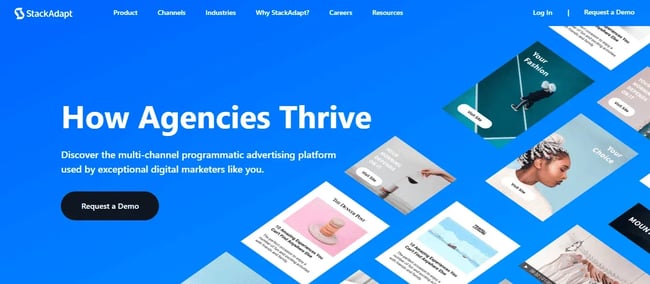
StackAdapt is a programmatic advertising platform that digs deep into business data to give unique insights, helping its customers develop and deliver high-impact campaigns to target audiences.
Here are my main takeaways for you:
- Advertising campaigns are its bread and butter, and it has everything you’ll need, from planning and execution to analysis.
- It has plenty of media channels, which is great for marketing professionals who use more than just social media and browser ads. For example, I was surprised to see connected TV and in-game advertising options available.
What I like: It has services that are tailored toward a wide range of industries, like finance, healthcare, and gaming.
Price: Contact them for pricing information.
11. Hootsuite
If you’re a social media marketer, you might have this marketing and management tool. It does its job well, but it won’t interest marketers who don’t leverage social media much.
Here are some stand-out points from this top name:
- AI content creation from OwlyWriter, which didn’t impress me as much as I’d hoped.
- Social advertising, including publishing, analysis, boosting, and reporting on how ads are performing, all from a dashboard I found very easy to get around.
- Social listening, which will be further boosted if an upcoming acquisition of Talkwalker goes through.
What I like: The publish and schedule feature saved me hours of time and gave me good inspiration for new posts.
Price: The Professional plan is $99/month, and a free 30-day trial is available. This is limited to one user, so I wouldn’t recommend it for an agency.
Grow Better With Ad Management Tools
I hope this journey through advertising management tools has not only been informative, but helped you understand how they can help — and maybe even pinpoint the tool that will best fit your needs. I find advertising management tools to be a great time-saver in my work, and I love the data and insights they give me.
If you haven’t used any before or are looking to change things up, try a few of them out — on a free trial if possible.
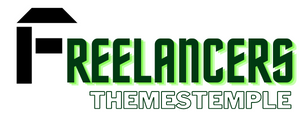

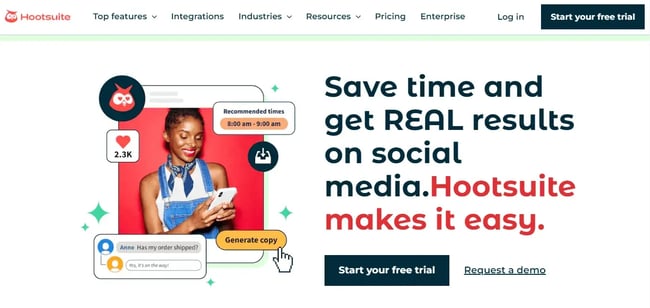
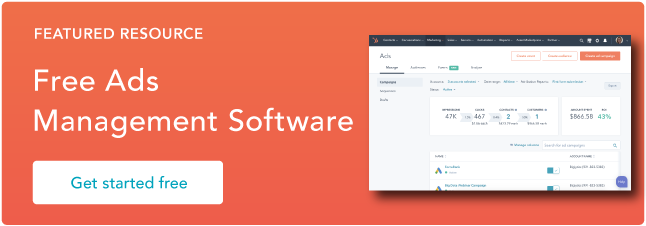


![How to Optimize for Google’s Featured Snippets [Updated for 2024]](https://moz.com/images/blog/Blog-OG-images/How-to-Optimize-for-Googles-Featured-Snippets-OG-Image.png?w=1200&h=630&q=82&auto=format&fit=crop&dm=1724004002&s=13df73104762982790dab6dc8328023f)

